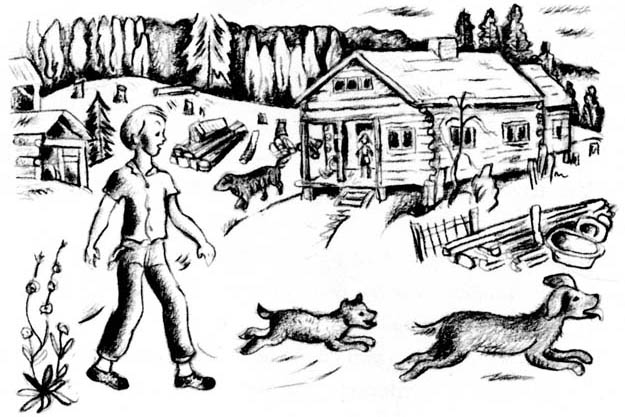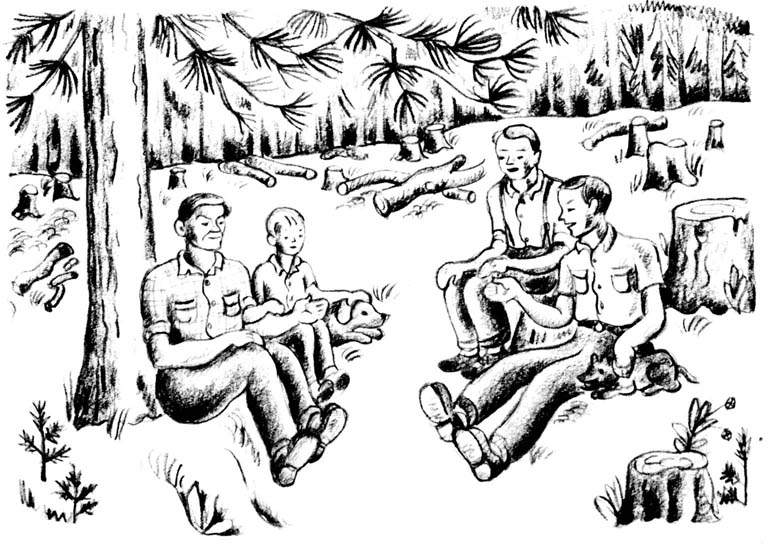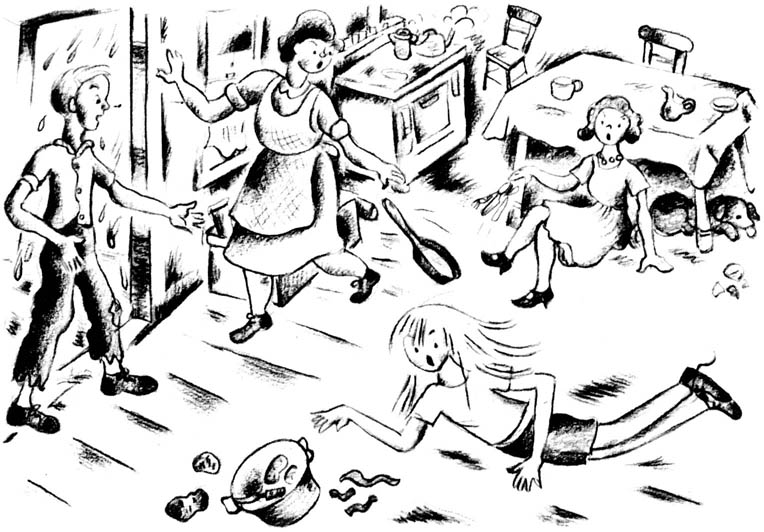

Chapter Two
THE HOUSE
“Golly! We’re gettin’ company!” cried Joel.
Two cars came up the woods road and people began to pile out. Joel ran to meet them. It was Uncle Irv and Aunt Ella and their children, and Uncle Curt and Aunt Bertha with theirs. Uncle Irv and Uncle Curt were Mom’s brothers. It was Sunday and they all came to spend the day.
The women brought food, so they cooked and fussed in the kitchen. Mom’s biggest coffee pot was full and boiling over. The children ran in and out and kept getting underfoot. The men found a shady spot in the yard outside. They stretched out and talked. Joel sat down and listened.
“You been laid off?” Curt asked Big Joe. “Nellie said she thought so.”
“No, I quit!” said Dad. “My boss knows too much for his own good. I got mad at him and quit.”
“Nellie says she never knows what time you’re comin’ home or if you’ve took a new job or quit or what …”
Dad smiled, but did not answer.
“What you been doin’ around here, Big Joe?” asked Irv. “A little loggin’? Looks kinda bare round the old house, don’t it?”
The old log house, built by Granddad Bartlett, stood above the creek with trees around it. They had grown thicker and larger and bushier since Granddad’s death, so the house had been getting shadier and darker. The ridge to the east kept the sun off in the morning and the ridge to the west kept it off in the afternoon.
Big Joe was like Granddad. He wanted the sun. So he began clearing the trees away. Cutting down trees was pure pastime. He did it because he enjoyed it.
“Guess I’m like my dad,” Big Joe said. “Trees are something to cut—to be got rid of. When I want more sun, I fall ’em down!”
Curt and Irv laughed. They agreed. They were loggers, too.
Logging was Dad’s way of life. He had learned it from Granddad and from all the neighbors—the old-timers and those his own age. Timber meant money in their pockets. Cutting trees was a means of subsistence, the way to keep their families from starving. They did not stop and ask themselves do I want to be a logger, or do I want to do something else. They were loggers and knew little else. Once a logger, always a logger.
Even Joel could understand that.
Dad had been clearing land for a long time. Whenever he came home early, or on Saturdays, or when he was laid off, he worked at clearing the land. He was not a man to be idle. He cleared the pastures for the cows and kept on clearing up the steep slope back of the house and far up the mountain on the next rise. There was an old log barn up there where he stored feed for the cows and fed them.
“When you gonna cut the big timber, Joe?” asked Irv.
“Or maybe you’re gonna sell it for stumpage?” asked Curt.
Dad shook his head.
“I’m keepin’ it,” he said. “Keepin’ it till I get my own show. Two hundred acres I got, the purtiest big timber you ever saw in your life. Purty nice nest egg, don’t you think?”
The men agreed. They were in fact envious. They had not inherited any timber.

“I often think about the old man,” Big Joe went on. “Mighty good of him to will me all that land, just when I come home from the Second World War all done out. Three hundred and twenty acres, a whole section—two hundred acres of it in good timber.”
Joel liked to hear about Granddad. He sat as close to Dad as he could get, locked under Dad’s arm. He listened, wide-eyed and wordless, drinking it all in.
Granddad was an old-time logger, who came to Oregon when it was still full of trees, virgin forests of giant trees, but to him and the early settlers they were just something to be got rid of. Granddad felt he was hemmed in by the mountains. As a boy he had lived in Nebraska and never knew what a mountain was. In Oregon, the mountains irritated him. He was closed in by the forest and could not see out. To him, logging was like skinning the fur off the side of the mountain, for the trees grew as thick as the hair on a dog’s back.
Granddad’s idea was: “Tear ’em out, cut ’em down, get rid of the forest. The trees are in the way, we can’t see out. Whack ’em down, so we can see the blue sky and see off over them hills …” Funny then that he built his house down in the valley. Why didn’t he build it up on top of the mountain? Was it too hard to get up there?
Granddad had cleared all he could, but the two hundred acres of timber were left intact. He had never got around to that. Two hundred acres of tall, beautiful timber in the Cascade Mountains, left to Dad as a legacy. Timber meant money, security. It was money in the bank. There it was waiting, timber for the taking.
Irv and Curt looked at each other.
“You’re a rich man, Big Joe,” said Irv.
“Nice job you’ll have gettin’ it out!” said Curt. “Gettin’ it to market will be one whale of a job.”
“I know,” said Dad, soberly. “I’ll get my own show. I’ll do it myself.”
“Where will you get the money?” asked Irv. “A cat with a dozer and a logging winch costs thirty-five thousand. You’ll have to pay at least a third down.”
“A lot of money for a logger,” said Dad.
“Even for you?” asked Curt. “You makin’ big money like you do, toppin’ trees and gettin’ the highest wages anybody gets?”
“Even for me,” said Dad. “Taxes have to be paid on the timber or I’ll lose it. A family to feed—and Nellie can’t save a penny. She just lets money slip through her fingers …” But he did not like to talk to her brothers about that, so he stopped.
From that day on, Big Joe’s goal was set. He made up his mind to keep that two hundred acres intact, no matter what happened.
Before he took another job with another outfit, he kept on clearing the hundred and twenty acres. Firewood was always needed and certain trees were better for that. Rail fences were built, a log hog pen and chicken coop were put together somehow, good enough to keep the winter rains out. Dad wanted the stuff cut off, to clear more pasture for the cows. Cut down the pines and firs, stash the brush and burn it. Get the stuff off. He kept on clearing and Joel helped him. Soon the boy could saw and chop like an expert. And he loved it, too, just as his father did.
Dad bought a cat, a small one, a bargain. Someone he knew couldn’t keep up the payments, so Dad took it over. He set up an A-frame and began to get logs out faster. He rented a truck for short logs and hauled them himself. He showed Joel and the girls how to peel logs with a spud. The spud took the bark off the poles. The logs brought two hundred dollars more on a load if they were peeled.
Dad paid the children two cents a foot for peeling. They began to save their money.
The trees so close to the house still bothered Dad. He decided to clear them from the house to the creek. Saturday would be a good day to start. The evening before, Dad and Joel went down to look things over. They stared in surprise.
“You been fallin’ trees here, son?” asked Dad.
“No,” said Joel.
Several small trees were lying on the ground. They had been chopped off at the base and cut into chunks. There were other peeled branches lying around.
“Sh! Look! Beavers!” said Joel. “See the old one over there?”
There in the creek they saw him, pushing a branch ahead of him. On the bank stood the female gnawing a tree, with three little ones. They stood stiff like statues. Suddenly the big beaver whacked his tail and dived under. The next minute they were all in the water.
“They’re pretty good fallers and buckers!” said Dad.
He pointed out skid roads where the beavers had been snaking the trees down to the river. Under its bank, they were storing the branches, to keep the bark green for future eating.
“Looks like the beavers want to help us,” said Joel.

“Purty good loggers!” laughed Dad. “The whole creek needs clearin’ out …”
“Don’t clear out the beavers, Dad,” said Joel.
“They’ll just move farther down stream,” said Dad. “I want to log all these trees off the side of the hill, to get more light in the house.”
“When you log too many trees off, you get landslides,” said Joel.
But Dad did not listen.
He worked that week at it and made good headway. He cleared out the creek, took the trees down and bladed off the bank with his dozer. Then a big rain came and he had to stop. It rained for three days. It poured and soaked the slippery clay ground. It rained so hard, it began to wash the hill and the house started to slide.
Mom and the girls were inside cooking supper. The house gave a jolt and Mom dropped the frying pan on the floor. She caught herself and held onto the cupboard. Jinx was peeling potatoes and Sandy was setting the table. They both took spills on the floor.
“Earthquake!” cried Mom, white in the face.
Dad came in soaking wet.
“Earthquake!” cried Mom again. “Did you feel it?”
“Hold your horses. Don’t get excited,” said Dad, calmly.
“But the house moved—I felt it!” cried Jinx.
“So did I!” cried Sandy.
Joel came in, drenched to the skin.
“The house slid, I saw it!” he announced. He sounded excited. “It moved a foot. It’s starting to slide down hill.”
“Glory!” cried Jinx. “I’m gettin’ outa here!”
She ran toward the door.
“Come back here, girl,” said Big Joe. “It’s rainin’ out. Stay inside and keep dry.”
“But if we land in the creek,” wailed Jinx, “we’ll all get wetter.”
“It’s your fault, Dad,” said Joel. “’Cause you took off so much of the bank and logged those trees off the side of the hill. Now the house is going to slide right down into the creek.”
Mom made a big fuss about it. Next day, Dad sunk some heavy logs down to hold the house, but after every rain it slid some more. It was the rainiest, wettest spring in years. More rains and the house slid off its foundations. Doors would not shut, the windows were crooked, the glass in them broke and big cracks came in the floor.

Mom wanted to move out right away. The barn was halfway up the mountainside. She threatened to move up there. But Dad paid no attention. He didn’t seem to care.
He just kept on cutting trees down. Joel could think of only one reason why. It was the thing he liked to do best.
Mom wanted Dad to get back to work—something besides logging. She talked a lot about it. Couldn’t he get some other kind of a job, so they could move to town and live there?
What else could Dad do, anyhow, if he changed jobs? Joel thought about it.
He could never be a carpenter, even if that meant working with wood. He could not even pound a nail in straight, Mom said. Look at that closet shelf he tried to put up. It was always coming loose and falling down.
He could never be a plumber. Look at those gravity pipes from that mountain spring. Dad had dug a big hole on the mountain side, higher up than the house, for the spring to fill up. It was to run of its own accord, an easy way to get water. But the pipes got busted. Mom said the cows tramped on them and Dad said it was the horses. Anyhow, the pipes got wrecked. Dad never rigged them up again, so there was no spring water to drink.
And the well with the electric pump … When the hillside slid, it broke the pipes and the well got covered up. Something got into it like diesel oil, and the water wasn’t good any more. There was always the rain barrel at the side of the house. And down the road, across the highway by the store, there was a good spring, so water had to be carried after that in two big five-gallon cans.
When Mom talked about moving out, Dad began to talk about building a new house. For a long time now, he had been bringing in secondhand lumber in the pick-up. The Forest Service tore down a couple of old homesteads and Dad bought some of the used lumber and hauled it in. He bought used plumbing fixtures and dumped them in the yard around the house, too, along with old tires, window sash, broken wheels, piles of old rope, cans of paint, and other useful things. Dad had a plan of his own, all right. Other loggers in the area had salvaged used materials and were planning to build some day.
“What’s all the junk for?” Mom asked. “You goin’ in the junk business, Joe?”
Dad said, “Now you know, Nellie, I’m goin’ to build us a nice new house …”
“Out of all that rotten lumber?” Mom laughed.
Dad said, “It’s good wood.”
“It’ll take twice as long to pull the old nails out and get it in shape,” Mom insisted.
“The boy can do that,” said Dad, looking at Joel and grinning.
Each time, after a rain, when the house slid a foot or so, and a few dishes got knocked off the table, Mom complained and wanted to move.
Dad just said quietly, “We’ll move when I get the new house built.”
He really meant it, Joel could see that.
Mom would begin again, “How can you ever build a house when you can’t pound a nail in straight?”
Dad did not like it. So he stomped out of the house, picking up his axe.
“Come on, Joel,” he called in a loud voice.
He strode off up the hill like a great giant, with the three dogs barking at his heels. Joel took his axe and went along. He chopped, too, and helped pile up the brush.
No, you couldn’t change Dad, Joel knew that. Even Mom with all her complaints never made a dent. Dad was what he was, a logger, and he’d never be anything else.
In June the rains stopped and a dry spell set in. The house stopped sliding halfway to the creek. A little willow tree held it.